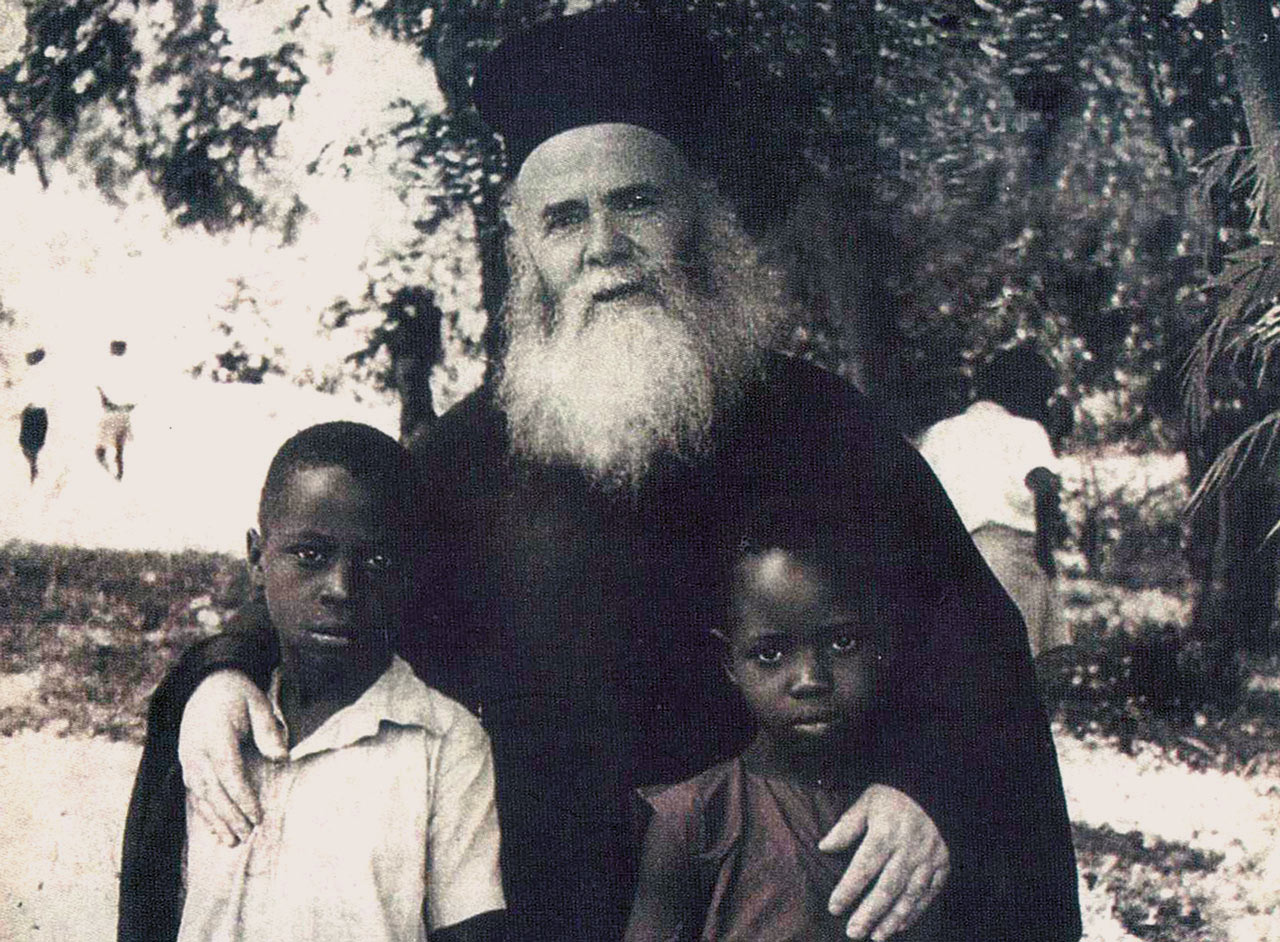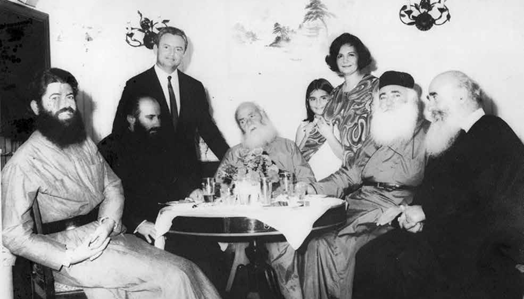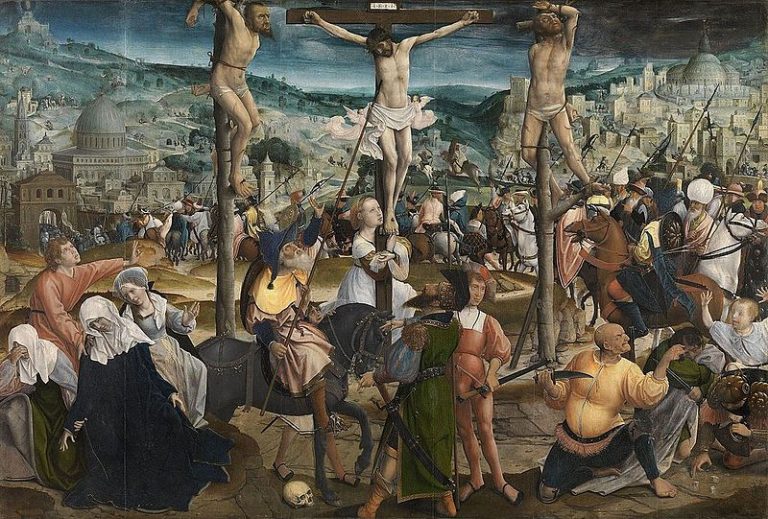Fr. Chrysostomos Papasarantopoulos’ Contribution to the Mission of Africa
The contribution of Fr. Chrysostomos Papasarantopoulos to the missionary effort of our Patriarchate is very important indeed. Unfortunately, a number of circles have tried, deliberately or not, to reduce, underrate, or cover the work of the heroic missionary figure Archim. Chrysostomos Papasarantopoulos, and disregard the contribution of Archim. Nicodemus Sarikas. Both of them ministered under the auspices and with the blessings of the Patriarchate.
Fr. Chrysostomos set out for Africa after having been to Alexandria and asking for the blessings of Patriarch Christophoros. He advised those of us who knew him or were in contact with him to be obedient to the Church and the Bishop, and added that only by means of our Prelate’s blessing can we serve and minister . He pointed out in a letter to Fr. John Athanasiadis: «As you are aware, the first «hearth»of the Greek Overseas Mission has already been established in Uganda of East Africa with the blessings of His Beatitude Patriarch of Alexandria and under the spiritual authority of His Eminence Metropolitan Nikolaos of Irinoupolis, whose blessings I convey to you.»
Fr. Chrysostomos was born in 1903 in a village of Messenia, Greece, called Vasilitsi. He had great love for education but because of his father’s death he was forced to leave school at the age of ten, when he was in the 4th grade of Primary School.
In 1918, that is one hundred years ago, when he was 16 years old, in pursuit of spiritual life he moved to the Koroni Monastery and then to the Hermitage of Panagoulakis (Holy Monastery of the Annunciation of the Theotokos) . When his brothers learned about that and went to take him, he did not accept to follow them, and he said, «Now I have finally found what my soul has been longing for, studying and praying.»
On the 4th of May 1926 he was ordained a deacon and then a hieromonk by the Metropolitan Meletios of Messenia, and received his new name Chrysostomos from Christos. Next he was appointed as the Igumen of the H. M. of Gardikiou. Together with him was his mother, who he tonsured as a nun, giving her the name Sebastiani. Soon he was transferred to the Monastery of Chrysokellaria, where he completed his school studies «via homeschooling». In 1938 Chrysanthos, who was enthroned as Archbishop of Athens and All Greece, called him to Athens and enrolled him as a monk in the Holy Monastery of the Bodiless Powers (Petraki). Then he appointed him as Igumen of the H. Monastery of Panagia Phaneromeni in Salamis.
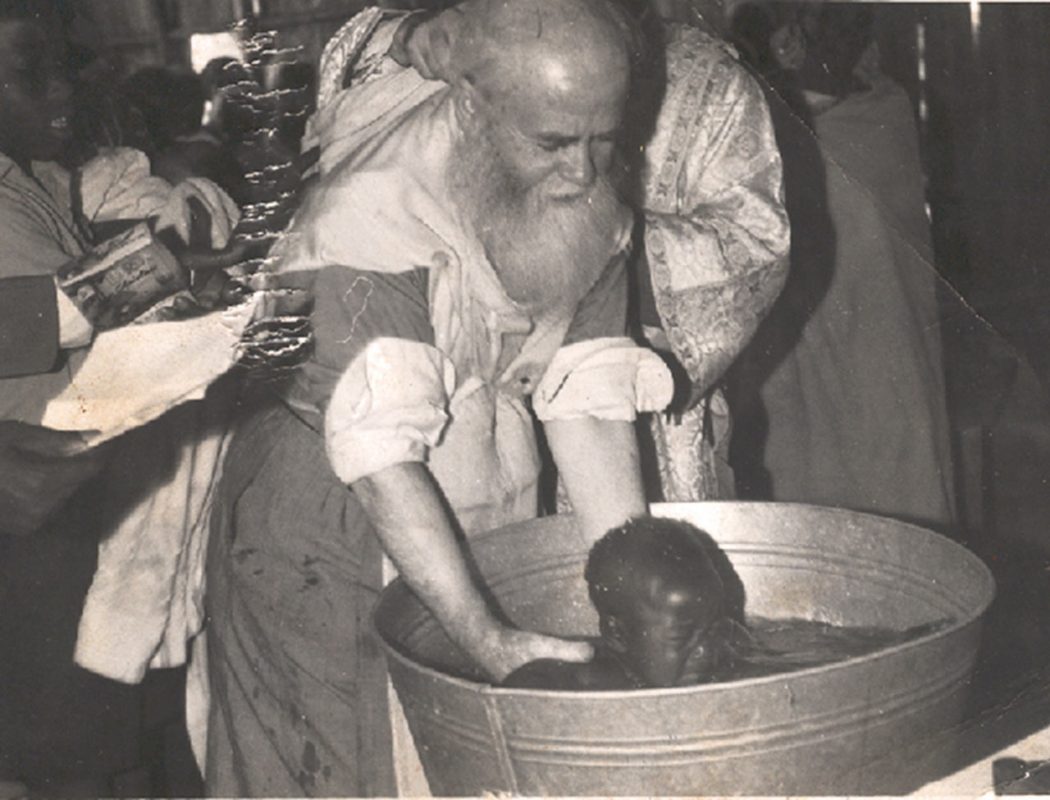
In 1941, with the beginning of the German occupation and the consecration of Metropolitan Panteleimon of Edessa, he went to Edessa to serve near him. He was appointed as Chancellor and served in the difficult years of the occupation. Archim. Theokletos Stragas writes about him: «In that ravaged Greek region, I met the late Fr. Chrysostomos Papasarantopoulos working with exceptional zeal and missionary self-denial. Despite the extremely harsh conditions in this central part of Macedonia, Father Chrysostomos traveled to all the suffering villages which were terrorized by OHRANA, where as a preacher and priest, particularly as an excellent confessor, did a truly remarkable job.” «He built the Monastery of the Holy Trinity under the waterfalls of Edessa. It is there that he became friends with Archim. Chariton Pnevmatikakis and Athanasios Frangopoulos, who served there as preachers.
In the early 1950s, we find him serving in the Church of St. Paraskevi in Nea Krini, Thessaloniki. It is there that he got acquainted through confession with my late beloved father. Then the following event happened. My elder brother (one year older than me) fell asleep in the Lord due to medical error. He was very healthy then, whereas I was constantly ill. My father then went to complain to Father Chrysostomos: «Why didn’t God take my sick son and took the healthy one?» And Fr. Chrysostomos replied: «George will become a priest.» This came true on July the 20th, 1971. He also told him facts about the course of my life, which were eventually verified.
From Thessaloniki he went again to Petraki Monastery, where he was given a great deal of time to study at the Theological School. As a student he got acquainted with Fr. Theodoros Nankyama from Uganda. He was already 58 years old. It is he who informs him of Mission in Uganda. At that point he hears the voice of God, and he shall answer. He writes in one of his earliest letters: «I could not do otherwise. The voice of our Master and Lord inside of me is authoritative, and I had to obey despite the protests of many beloved people.»
Bishop Theodoros Nankyama informs us: «When in 1959 Athens was visited by Arch. Rouvim (also known as Spartan), Fr. Chrysostomos became furious and got ready to go to Africa. He did not lose his courage even though many people tried to discourage him on the pretext of his advanced age and fragile health. Some did more than trying to deter him from leaving, they mocked him…” Even Archbishop Theokletos of Athens attempted to dissuade him from pursuing his vision: «You are old and sick, you will die there». Then Fr. Chrysostomos replied, «There are graves in Africa as well.»
He went to Patmos to consult the holy elder Amphilochios Makris. When he told him about his intention and asked for his counsel, the latter encouraged him and said to him: «How much I would like to go to Africa myself! My age and my state of health don’t let me, though; I would be a burden and I would not be able to respond to my duties. What a pity I have grown so old! I envy you, Fr. Chrysostomos!»
At Easter 1960 he went on pilgrimage to the Holy Land. From there he went to Alexandria to meet with Patriarch Christophoros and take his blessing for the realization of his decision to go down to East Africa. Indeed, the Patriarch gave him his blessing, and at the invitation of Mr. Soutis from Arusha, he traveled there, where he stayed for a while, and then he went to Kampala.
His Eminence Metropolitan Nikolaos of Eirinoupolis appointed him to the Secretariat General of the Metropolis. Fr. Chrysostomos says in his letter: Remember me in your prayers so that I will be proven worthy to a certain degree of the mission and the «church mission” whose Secretariat General was assigned to me by the Most Reverend Metropolitan of Eirinoupolis, -and be able to contribute a little myself to the glory of Christ and His Church….». As regards his missionary activity in Uganda, we will let the Ugandans speak for themselves about it.
Fr. Obadiah Basajakitalo writes: «The Very Reverend Archimandrite Chrysostomos Papasarantopoulos served devoutly the will of God in East Africa for many years.
Fr. Chrysostomos was not a salaried religious employee, but one of the most patient priests I have ever encountered, totally devoted, most industrious, always humble, never possessed by anger, I stress that, absolutely never, an exemplary teacher and philanthropist.
I marveled at all the ways he handled the holy flock of Christ which was entrusted to him.
He would never think highly of himself or be possessed by avarice.
His experience in conducting church services was incomparable.
Naturally, we, African Christians, loved him very much.
I accompanied him on his journeys, both in Uganda, as in Kenya, in East Africa. I was always in close contact with him. He would always make the most of his limited spare time. I never saw or heard anyone accusing him or complaining about exploiting their kindness, nor did I see him quarrel with anyone.
During his stay in Uganda and Kenya, he made great efforts to learn the languages of Swahili and Luganda, and he succeeded. He did learn them both. He was able to learn Swahili better and could preach the Word of God in it. He even managed to translate some church books into it.
We may feel free to say and conclude that Archimandrite Chrysostomos was the most popular of the Orthodox ecclesiastical rulers in East Africa.
May the Benevolent God grant rest to him.
Rev. Fr. Obadiah K. Basajakitalo. Vicar General of Uganda Church of the Nativity of Christ, Bugollo-Ginza-Uganda. July 1973
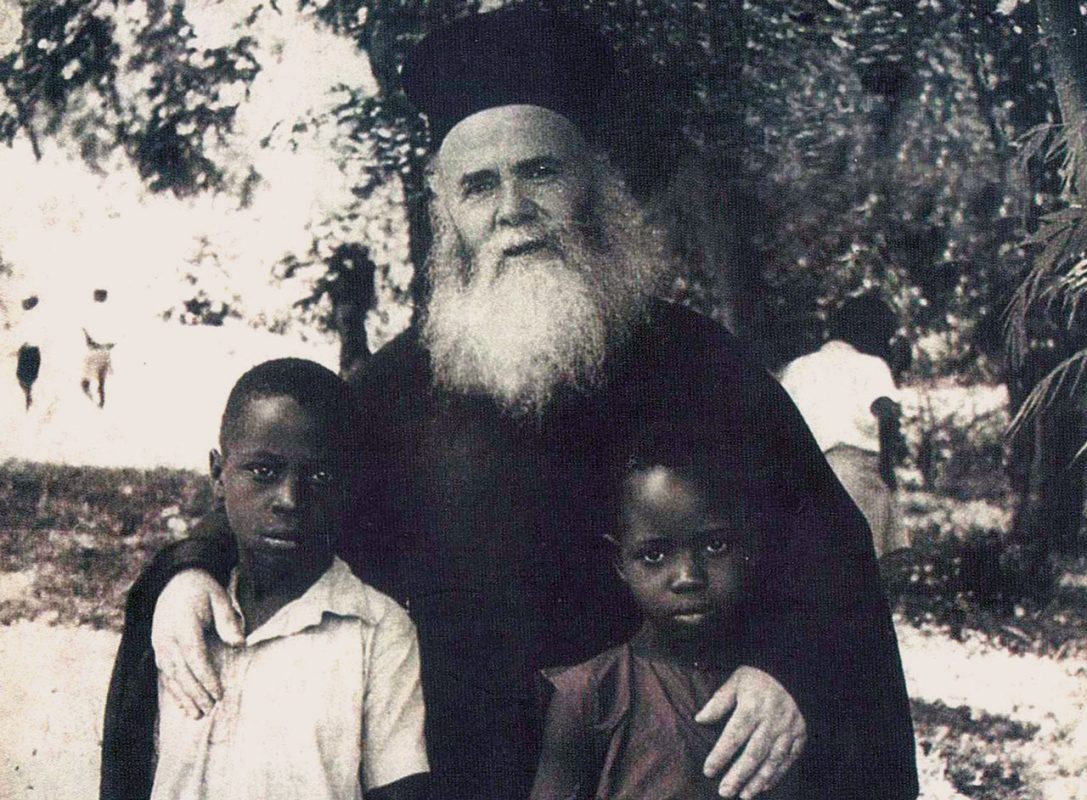
Rev. Protopresbyter Fr. Eirinaios Magimbi writes, «Late Fr. Chrysostomos arrived in Uganda in 1960, after having discussed this matter for four whole years with His Grace Bishop Theophilus at the University of Athens, when studying Theology. It was then that he decided to enter the Mission field and undertake the missionary work in Eastern Africa.
Fr. Chrysostomos loved Mission wholeheartedly and dedicated his life to the dissemination of the Greek Orthodox Faith. He had such a fervent zeal and earnest desire to serve the Lord in the power of the Holy Spirit that he became a perfect laborer in the Mission field. When it came to the performance of his pastoral duties, he was proven a real missionary.
I in particular was a close associate of the late Fr. Chrysostomos from the very beginning, in fact, from the very first day of his arrival in Uganda. Together, with the help of God, we created many things and organized various activities anticipating fruition in our Mission. In general, we worked together for the establishment, development and fruitful progress of the Orthodox Faith in Uganda.
He promised God to serve Mission for 10 whole years, and indeed, he completed them with infinite and immeasurable love, since he was working hard and tirelessly for the dissemination and development of the Greek-Orthodox teaching.
When the late Father came here, the only place he found to live in was a little house in the church hill in Namugona. He used his own money to build this present house, known today as “Monastiraki” (little monastery). Firstly he rented a house close to a /the church. Then he moved into the unfinished structure so as to save some money from the rent. As he could not afford to complete it all, he only finished one room and covered it with a roof. It was after a whole year that he finally managed to finish the whole house.
On his decision, we went on pastoral tours all over Eastern Africa, and on these journeys I was given the chance to indulge religious emotions. This happened mainly because whenever we travelled to Easernt Africa, not even once did he seem to be disappointed for any reason; on the contrary, he was gifted with a great deal of patience, perseverance, and extraordinary temperance.
The deceased took action for a number of things, such as access to clean water and electricity, creation of libraries and printing houses, and so on. His life was exemplary and didactic. Our Mission is in very big need of “workers” like the late Fr. Chrysostomos. He wrote many letters to those who had heard or embraced Orthodoxy everywhere in the world. He had a good knowledge of English and French, and translated the Divine Liturgy. He even managed to master Swahili, despite its difficulties.
Fr. Chrysostomos sent me a letter on 24/12/72, in which he was inviting me to go and help him in Zaire, where he settled for two years searching for his black children. He explained to me that he was very tired and he was no longer able to do his job the way he should. Then, at the end of December, we heard that he had passed away.
The death of our beloved Father caused a great sorrow in our souls. Africa had lost a conscientious and wise/prudent laborer in our Lord’s Vineyard.
Uganda is in great need of many persons like Fr. Chrysostomos, who are able to spread the Holy Teaching of Christ. Many of the civilized African people still have not heard of Orthodoxy. The black children of the late Father repeatedly ask where he is and why he has left Uganda and Kenya. His good deeds were very didactic, and are still remembered in the depths of Africa: faith without works is dead.
Fr. Irinaeus Magimbi, Protopresbyter – Farmer, with a multi-membered family Orthodox Church of St. Nicholas- Kampala (Namugona), P.O. VOX 3970. Uganda
On the Christmas of 1963 he publishes in printed form and circulates the «Information Bulletin» as a journal of the Metropolis of Irinoupolis. Through it he informs its readers about the missionary efforts of the Metropolis, and publishes soul-stirring articles on Mission written by him, which raise people’s missionary awareness.
In the first issue, he publishes the “Resolution”, signed by Fr. Rouvim Mukasa Sparta and another twenty clergymen, as well as lay rulers of the so-called African Greek Orthodox Church of Uganda and Kenya. This consists of 5 articles. In it, the signatories express their commitment to the Orthodox Faith and Church, their absolute trust and dedication to the Patriarchate of Alexandria, to Patriarch Christophoros and to Metropolitan Nicholaos of Irinoupolis. They also express their desire to live by the Holy Canons and the General Ecclesiastical Rules, and ask the Metropolitan for «the drafting of a Charter and of Rules of Procedure for the H. Metropolis and each parish, which, once approved by the Patriarchate, should be notified to all the Orthodox Christians in Eastern Africa for compliance”. In it they object to any kind of racial discrimination.
In the same issue, he explains what “Mission” means and what its work involves.
In the second issue dated April 1st, 1964, which is a clarion call, he calls everyone to help. In it he defines what «a missionary» is, adding a new term, that of the «missionary associate,» and calls for the creation of groups in every place and every city in support of Mission. He explains to us that the neological term “missionary associates « refers to the devout Christians who, for reasons beyond their own will, cannot possibly move to a foreign country as missionaries. However, since they have the fervent zeal and the earnest desire for such work, they contribute to it – to the extent possible- both spiritually and materially, so as to support and enhance the missionary work and those undertaking it. This kind of «missionary associates « is what all pious and faithful in Christ people all around the world are called to become- regardless of country, town, social class, age or sex- and are asked to form groups and associations in support of this purpose…”
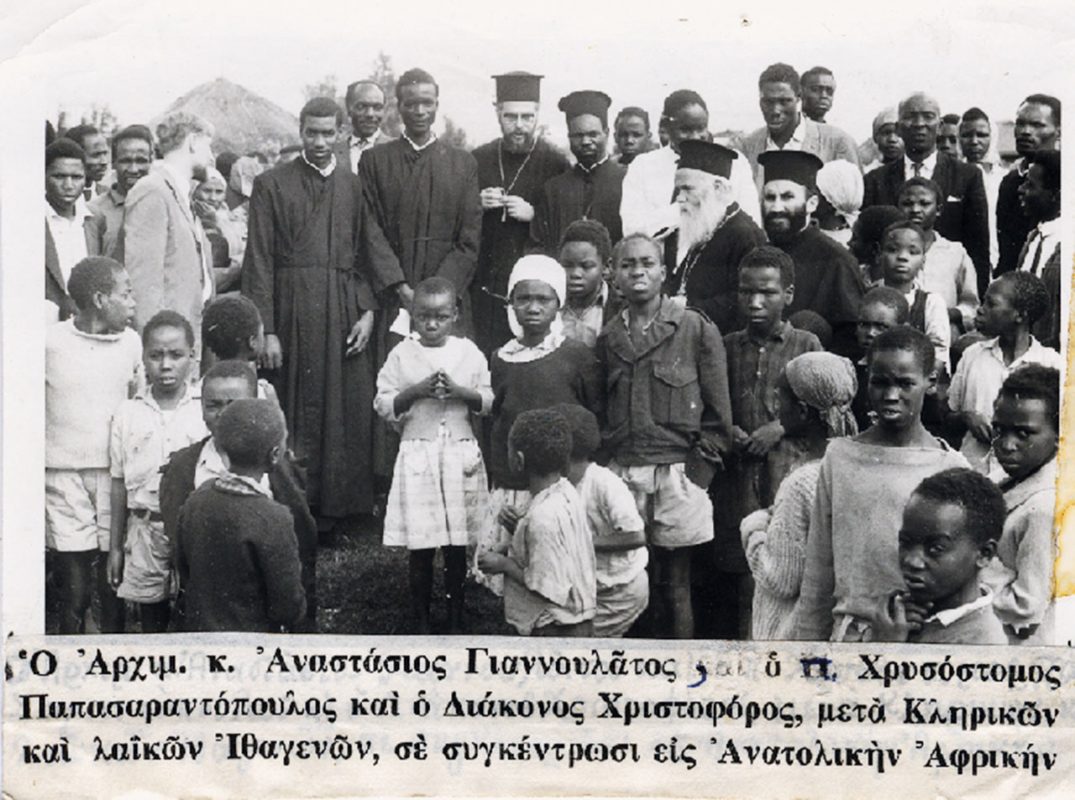
A year ago his spiritual children in Thessaloniki created the missionary society «Friends of Uganda». The purpose of this society is to help Fr. Chrysostomos, make his missionary work known, and also disseminate the spirit of Mission. They publish a periodical with correspondence and reports from missionaries as well as relevant topics, and organize regular meetings of young people with such topics and updates. Among the attendees, was John Aslanidis, later known as Fr. Kosmas.
Fr. Chrysostomos works hard and systematically, following a goal-oriented schedule. He considers the first five years of 1960-1965 a period of preparation. He writes about it: «This 5 year-period can only be regarded as preparatory. Of course, the work was not at all substandard and contributed a lot to the implementation of internal activities and projects. In fact, it resulted in several mass baptisms, the ordination of dozens of priests, the construction of buildings and improvements in institutional facilities and the like. Above all, our main concern was to raise awareness of Mission Outreach in Eastern Africa and make it known not only to the Greeks all over the world, but also worldwide, to all those immediately interested, as well as to every Orthodox soul, regardless of nationality. This aspect of such work is still absolutely necessary because, as we have often stressed, without external support and assistance, the missionary work cannot possibly move forward…
The new 5-year period of 1966-70 begins on 1st January. It is now time to focus mainly on the interior.”
In August 1967 he establishes the Seminar at Kagira Region (about 9 miles from Nairobi), where 28 seminarians were enrolled. The Blessing service, performed by Fr. Chrysostomos himself, was attended by Fr. A. Gadounas, the representative of the Municipal City Council and a lot of people.
“The Theological Seminary, writes his assistant Konstantinos Vassilopoulos, was the most important achievement for our mission, according to highly experienced Fr. Chrysostomos. He struggled incredibly hard to create, maintain and make the most of it in the best possible way.”
Fr. Chrysostomos mentions, «We hope for the Lord that He will bless our efforts, and that the operation of this holy nursery will be continued; and being constantly improved, it will eventually bear fruit. In order to achieve such results though, it is imperative that we have two, or at least one theologically educated person.
Fr. Chrysostomos was also involved in the field of translation. He translated into Swahili the Divine Liturgy of St John the Chrysostom, the Matins service , the Compline and the Salutations to the Virgin as well as the English version of the Orthodox Catechism by Metropolitan Germanos Polyzoides (Catechism of the Eastern Orthodox Church). He also translated the church calendars of the years 1966-1970 of the H.. M. of Eastern Africa, adding in the end dismissal hymns of Easter and other big feasts.
In 1963, Archim. Athanasios Anthides goes to Uganda close to Fr. Chrysostomos. He writes in his autobiography: «… in 1957, I went to Athens to study Theology. During the years of my studies, there was an attempt for a mission outreach, and the late Fr. Chrysostomos, immediately after his graduation in 1960, was the first to go to Uganda, Africa, as a missionary.
When I graduated in 1963, I went to Uganda and worked with him for one year. There I learned a lot of things from him because of the experience he had earned having lived in monasteries and churches since he was fifteen years old. There we established a Seminary, which generated the first fifteen African priests. After one year, he took me to Kenya with him. May his mandate be blessed.
In Kenya we established a Seminary, from which graduated 29 candidates for the Priesthood. I completed five church buildings, which Fr. Chrysostomos had not managed to finish as he had gone to Zaire (Congo) in order to avoid the “Mission theorizers”, who had come … . « It was for the same reason that I also went to Zaire , where I established a Seminary of eighteen candidates for the Priesthood, and then moved to Ethiopia.»
Ιndeed, after Fr. Chrysostomos’ death in May 1974, Fr. Athanasios moved to Mbujimayi, city of Congo, to continue the work started by Fr. Chrysostomos. It was to this city that Fr. Chrysostomos was going when he was struck by profuse bleeding, which caused his death.
Eastern Africa was the place where his Mission partners and associates came to his help and stayed for short or longer periods of time. Amongst them were Constantine Vassilopoulos, Maria Katsigaraki, Stavritsa Zachariou, Fr. Christophoros, Penelope Katshea, Sister Gabriella, and Fr. Amphilohios Tsoukos. Some others who believed they knew everything about Mission came just for a while. He writes deeply bittered: «All our visitors have offered us precious services and have refreshed a little our hearts and the souls of the members of the Missionary Division of our Metropolis as well as our native Orthodox brothers, wherever they visited them. But on the other hand, after literally bombarding us with brotherly advice, suggestions and remarks, even rebukes for our shortcomings and weaknesses, they simply left, leaving us with the bitterness of both the fast separation and «deprivation of their brotherly support» and our inability to continue supporting the sectors of missionary work they themselves launched.
In 1967 Metropolitan Nikolaos of Irinoupolis was elected Patriarch of Alexandria. Fr. Chrysostomos writes about his enthronement with great joy: «The bright lamp which was upon the low lamp stand of our Metropolis was appointed by His Divine Grace to the venerable high throne of Mark the Evangelist to let its light shine. We pray and hope in the Lord that in the days of the Archbishop and our Father Pope and Patriarch of Alexandria and All Africa Nikolaos of Irinoupolis, a new period of revival and prosperity rises over this ancient bright apostolic Throne, with the massive influx into Orthodox Christianity of indigenous African people from all over the African continent. The Lord wanted the evangelization of the Africans into Orthodoxy to start from this corner of Eastern Africa, where His Beatitude Patriarch Nikolaos was the first Bishop.»
He pins his hopes on the new Metropolitan Nicodemus Galatsatos, with whom they collaborated well in the first place.
Some “mission theorizers” are still creating problems. They say, « We will either make Mission the way it should be, or else we will dissolve it …». The prelates from the city of Athens show disregard for his work. In grief, Fr. Chrysostomos, writes to the Patriarch, «Your Beatitude, they say that we have done nothing, but we have done something. We have created the right conditions for those people who have the programs and the necessary capabilities to work. «I am worthless, incapable, unfit for so great a work.” In one of his letters he writes, “I don’t know what has been going on since a certain man came here… The Bishop’s attitude towards me has changed.» This negative atmosphere makes him go to Cairo, Egypt, where he meets with Patriarch Nikolaos. He had been ministering under his direction when the latter was Metropolitan of East Africa and particularly loved and appreciated Fr. Chrysostomos. Their feelings were mutual. Fr. Chrysostomos writes to one of his spiritual children, «I made a long- distance journey after Holy Easter. I went to Cairo, Egypt, where I presented myself before His Most Divine Beatitude Patriarch Nikolaos. He accepted me most favorably and with paternal kindness. He immediately appointed me to the H. Metropolis of Central Africa, (where I stayed for the last few months) as a preacher and a traveling spiritual father, but mainly for the work of Mission.»
He arrives in Kolwezi in November 1970, where he begins his missionary activity. Sixteen months later, Metropolitan Kyprianos of Central Africa sent him to Kasenga, where he worked for both expatriate Greeks and natives. Natives from Kananga were informed that an Orthodox missionary was in Kasenga, and they sent delegations there to ask him to go to their place and preach Orthodoxy. They said to him that there were thousands of them thirsting for God and true faith. In his letter of 3rd July 1972 he writes to us: «I have some information that will make you rejoice. I want all of you, clergy as well as brothers and sisters in Christ, to pray fervently. Delegations of natives from Congo’s inland (I am at the southern end) have come here again and again, asking me to go to their region and preach the word of God, as all of them want to enter Orthodoxy. I presented myself before the aforementioned Metropolitan and took his blessing to go there. I’m planning to travel this August, more than 1,200 miles further. Bless and pray.»
In May 1971 he stops at Kinshasa for five days but the Greeks asked Metropolitan Kyprianos to keep him with them. The Metropolitan sends him there for a month in August 1971, and on 17 September he returns to Kasenga.
Having no one to help with the Mission fills him with sorrow. « Lack of human resourses makes my heart bleed .Yet, a few is better than none”, he wrote in a letter from Kasenga in July 1972. That is the reason why from the very first moment he went down to Africa, he started writing letters asking for help, but pointing out that whoever came down, should have the blessings from the Patriarchate and the Metropolis. «As His Grace Bishop of Naukratis Theodore Nankyama writes, Fr. Chrysostomos supported the institution so that the Mission to East Africa could become international. Anyone who wanted to come down, whether Greek, Russian, Yugoslav or Romanian, would only be accepted if they received permission and blessing from the Patriarchate of Alexandria”.
In August 1972 he was sent back to Kolwezi by Metropolitan Kyprianos of Central Africa, probably because the natives had been fervently seeking his presence. On August 7 he departed from Kasenga and went to Kolwezi. Fr. Chrysostomos himself writes, «With the consent and blessing of His Eminence, I came back again, not as a parish priest this time but as a missionary –Missionnaire de l’Eglise Orthodoxe– for the native people, who had been asking for my return …»
On August 13 he celebrated the Divine Liturgy in Swahili in a plain classroom. Ever since, he was performing it in the hall of his house, where, as he says in his letters, lots of faithful came on foot, even from afar.
As a catechetical tool, he used the book «Catechism»by His Eminence Metropolitan Germanos Polyzoides. He writes: «I have distributed it to the educated and the chiefs of the natives, and they themselves, under my guidance, catechize the majority. I am expecting the consent of His Eminence of Central Africa to begin baptisms or confirmation of the newcomers into Orthodoxy so that we can have the establishment of the African Orthodox Church of Kolwezi. The number of faithful may exceed 100. Meanwhile, the two cities of Kananga and Mbuji-Mayi in the interior of the country are anxiously awaiting my arrival.»
On 12-6-1972 the sect «Eglise de Mystere de Jesus Christ» of Kananga sent a letter to the Metropolitan of the Orthodox Church asking to be catechized and enter Orthodoxy. On 15-7-1972, Metropolitan Kyprianos answered seeking clarifications. He soon ordered Fr. Chrysostomos to go to Kananga.
Fr. Chrysostomos arrived in Kananga by rail in early October 1972 accompanied by Sister Olga. On November 8, 1972, the Governor of the Province signed the approval of officiating for the Orthodox Church Missionary in Kananga. The first Divine Liturgy was celebrated in the house where he lived.
He visited parishes and the surrounding villages with the accompaniment of Edmond Lukwete Bakajika, the leader of one of the sects that had invited him. He observed the world’s desire for Orthodoxy. «Then,» as, one of the first catechumens, Fr. Cyril Bakatufikila writes: «he called the sect leaders and on November 20th, 1972 at 4 o’clock pm. he held an assembly, which was also attended by the regional head of the Department of Justice. He talked to them about Orthodoxy. He was so convincing! His preaching was so amazing that the people there had never heard anything similar before in Kananga, either by Roman-Catholics or by Protestants. «At the end of the assembly, Kabeya Noe, one of the attendees, said that he would concede a plot of land on Kamuandu Avenue to the Orthodox Church.
On December 12, Fr. Chrysostomos performed his first baptisms and weddings.
On December 13 he set off for Mbujimayi. There was a priest ordained in Greece, Fr. Kalala Kalonsi. Unfortunately, on the way the car got stuck in the sand due to heavy rain. It is at that point that the bleeding occurred. After being given first aid, he was forced to stop the journey and returned to Kananga to receive appropriate medical treatment.
On December 25 it was difficult for him to officiate, and the next day he was admitted to a Kananga Medical Clinic. On December 29, 1972, he delivered his spirit to God. Three days before his repose, he had told Sister Olga that in three days’ time something important was going to happen. There was no Orthodox priest to read the funeral service. What he had answered those who were telling him to return to Greece finally came true: «I’d rather die unglorified in Africa, than glorified in the peace and silence of my cell. I can’t go away from here; I don’t want to, something holds me back.»
A few days later, Vicar General Fr. Emmanuel Zoppas came from Lubumbashi and went through the funeral service over the grave saying, «My brothers, the departed is not dead. He is alive. What happened was God’s will.»
Indeed, Fr. Chrysostomos left this world as a martyr, which reminds us of his words: «Some people need to die as martyrs to get our mission started.» And this is what happened. He himself suffered hardships for his faith and went through his own martyrdom, shedding his blood on the African land.
In Kananga he was succeeded by Fr. Chariton Pnevmatikakis, with whom he had a close friendship and a spiritual bond since their ministry in Edessa; in Kolwezi, by Fr. Amphilochios Tsoukos, who brought John Aslanides, later known as Fr. Kosmas Gregoriates, and Archimandrite Nectarios Hadjimichalis. Finally, Fr. Athanasios Anthides went to Mbujimayi in 1974.
In 1977 his exhumation took place. Those who helped in it say the following: Initially, permission was sought from the state for the exhumation. According to eye-witness testimonies, when the grave was opened, they noticed that his priestly vestments were intact and part of the spine had not decomposed; it was red and it was bleeding. Fr. Chrysostomos Bakuatshibaso writes: “Fr. Chariton asked Fr. Andrew Kayaya and me to hold the box and a white sheet to cover the part that had not decomposed yet. He put it in a basket to lay it in the same grave. «The same testimony is mentioned by those performing the exhumation, Fr. Andrew Kayaya, Gerasimus Kamgu and Evarestos Musenge. The whole incident was reported to Metropolitans Ignatius of Pentapolis and Nikiphoros of Kinshasa at an ecclesiastical assembly in Kananga in 2016 by clergymen, some of whom had witnessed the ceremony of exhumation. Clergy and laymen also mentioned other miraculous events, stressing the fact that every time they invoked his help, he gave it to them, and adding that to them he was a holy man.» Besides that, they said that whenever Fr. Chariton faced a difficulty, he would go to the grave to ask for his help, and he did receive it. Once he had reached the point of preparing his suitcase to leave. He only went to the grave to say goodbye. He cried out in anguish, «Why did you bring me here and you are not helping me out? Don’t you see the difficulties that I’m going through? I’m leaving this place.» Soon though, he calmed down as if someone had talked to him and reassured him that he would overcome the difficulties he had to face. We are told by Fr. Andrew, who was present, «He turned around, unpacked his suitcase and stayed.» This incident as well as other similar ones were mentioned to us by Fr. Chariton himself on New Year’s Day in 1986, when I visited Kananga along with His Grace Bishop of Rodostolos and the current Bishop Nathaniel of Amantia. He also told us: «When I performed the exhumation ceremony of Fr. Chrysostomos, I took his relics, laid them on the throne and exclaimed, “Fr. Chrysostomos, bless your people.»
The missionary tree in Congo was planted by the Triune God through Fr. Chrysostomos, who watered it with his own blood. Today we can feel his help coming from heaven. His tree is growing and bearing fruit. As regards his contribution to Christian Mission in East Africa, those engaged in ministry there could speak better.
Finally, we could say that Fr. Chrysostomos had not been sent by any association or brotherhood, but as he himself wrote on June 14, 1960, «It couldn’t be otherwise.» The voice of our Lord and Master Jesus Christ is compelling inside me, and I simply had to obey despite the protests of many people beloved to me. The angel of the Lord always preceded me and opened all doors, so that I would not encounter any serious difficulty.
His ministry always had the blessing of the Patriarch, as he believed that the Mission work performed falls under the auspices of the Patriarchate, which he humbly served.
He outlined the goals, targets and ways of action of our Patriarchate’s missionary effort. He was practical as a person, not a theoretical one. He moved having full confidence in God.
He constantly wrote letters and through them he not only updated people but also stirred their souls, putting them before their responsibilities regarding Mission. In one of his last letters, in November 1972, he wrote to a student, deacon and spiritual child of his who postponed his departure for Africa: “I myself will definitely fight with all my power on this battlement and I may die fighting on the front line. You, though, as a brave young man, at least undertake the task of telling all our students and seminarians, all our younger celibate clergymen, the following verse of old Tyrtaeus to the warriors of Ancient Sparta…” Shame on you! You should feel ashamed for letting an old feeble man die fighting on the frontline while you, young men, stay on the backline”. Not that I deserve or offer anything, I am only an unworthy servant and earnest worker of the Lord… But your struggle is not meant for a low-wage job, it is meant for something lofty, noble, eternal.”
The news of his death sounded like a major spiritual earthquake all over Greece. The Holy Synod of the Church of Greece issued circulars, declared March 18, 1973, Sunday of Orthodoxy, in memory of Fr. Chrysostomos’ sacrifice in all churches and held a memorial service for him. Magazines and newspapers had articles on him and radio broadcasts stressed his missionary work and his virtues.
Fr. Chrysostomos was not just a remarkable person, he was the pioneer who began the new era of Mission under the auspices and blessing of our Patriarchate in Africa, and was an inspirational role model for many people in the rest of the Orthodox world, Asia and America. ∎

